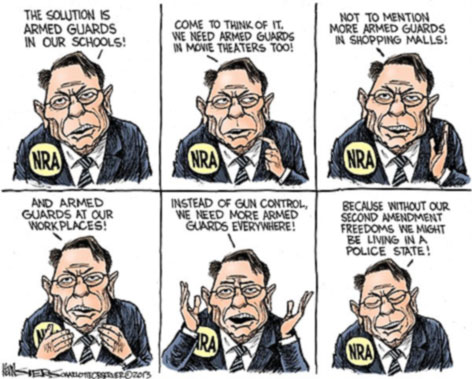
Washington is one big magic show. In black tie and tails, the Senate points to the bereaved parents of Newtown, Conn., where 20 children and six adults were shot to death. While the audience is focused on the Newtown horror, senators vote to take up a bill that would do absolutely nothing to avoid such a tragedy. A grateful nation, fooled by what magicians call “misdirection,” applauds like crazy while, in the wings, the National Rifle Association cackles in triumph. The Senate reaches into its top hat and, with appropriate flourish, extracts a bird. We expect a dove. What we get is a turkey.
The ugly bird of a bill would expand background checks and increase the penalty for illegal gun sales. Good. But the Senate voted only to consider the bill, not pass it, and already some members who voted for consideration have announced their opposition. More to the point, even if miraculously enacted, the bill would not have stopped 20-year-old Adam Lanza from his murderous rampage at Sandy Hook Elementary School. The guns, after all, were not even his.
The Bushmaster XM15-E2S rifle belonged toNancy Lanza, his mother. It was purchased perfectly legally. A shotgun was used by Adam to kill her. It too was legal. He then used the Bushmaster at the school, reloading frequently. For some reason, he didn’t always expend all 30 rounds in the magazine but rather paused to reload. He also had two of his mother’s handguns, one of which he used to kill himself.
The other pertinent mass murder, the killing of 12 people in an Aurora, Colo., movie theater, also entailed the use of legally purchased weapons — a Remington Model 870 shotgun, a Smith & Wesson M&P 15 semi-automatic rifle and two Glock handguns. James Holmes bought them all — and 6,000 rounds for the Glocks and the Smith & Wesson — while he was seeking psychiatric treatment and undergoing a clear psychological breakdown. Yet since he had never been convicted of a felony or involuntarily institutionalized, he was entitled to his weapons — and would be under the proposed bill. So much for background checks.
Look. I understand. Every little bit helps. And if background checks can be extended to gun shows and private-party transactions, this would be a benefit. So, too, I add oh-so-tentatively, could better mental health programs. But unless a patient comes to see a shrink armed like Pancho Villa, crossed bandoleers on the chest and two pistols on the hips, nothing is likely to be done. Mental health experts are far from expert in predicting violent behavior. Both Holmes and Lanza had been seen by experts — and Holmes’s university psychiatrist had, in fact, alerted campus police. They did nothing.
The Newtown and Aurora tragedies are, in fact, anomalies. They get our attention, but the real threat to us all is day-in-day-out gun violence. Having an estimated 310 million firearms around is a prescription for mayhem. I fear the dreaded assault rifle as much as I do a lightning strike. Handguns are a different story. I imagine them under the seat of the car that cuts me off or in the waistband of some kid who can’t tell the difference between a “diss” and a lethal threat. The sheer ubiquity of guns is frightening.
New York City has half the suicide rate of the nation a whole. Could that be because New Yorkers are jolly, happy-go-lucky types, singing “Zip-a-Dee-Doo-Dah” as they pack themselves into the subway? Nay. It is because very few New Yorkers have guns. In New York, only 12 percent of residents who commit suicide use a gun. (They prefer hanging.) West of the Hudson, the number is a robust 51 percent. “People who have ready access to guns are more likely to kill themselves with guns than people who do not,” said Thomas Farley, the city’s commissioner for health (and tautologies), in a news release. Usually, it’s a good thing to make it difficult for people to kill themselves. In the morning, inevitably, the sun comes up.
In 1959, Gallup reported that 60 percent of Americans favored a total handgun ban. Nine years later, Milton Eisenhower, Dwight’s younger brother and the former president of Johns Hopkins University, proposed the confiscation of nearly all handguns. Today, only 24 percent of Americans would support such a ban. The Milton Eisenhowers of our own time read the polls and go quiet or cheer the mere consideration of a bill that would do very little. You could call it a beginning but, as we all must know, it is really the end.
Read more from Richard Cohen’s archive.




No comments:
Post a Comment